What Are The Best Cannabis Fertilisers?
Besides good-quality soil, fertiliser is essential to maximising the yields of your cannabis plants. The wide array of organic and chemical fertilisers available is extensive, and there are many ways to concoct your own at home. Delving into the differences between all these options can help you decide which is most suitable for your project.
There is much to consider when determining the best fertilisers for your cannabis growing project. Similar to other plants, cannabis requires essential nutrients to flourish. These key macronutrients are nitrogen (N), phosphorus (P), and potassium (K)—collectively referred to as NPK. There are many different products out there that contain a blend of macro and micronutrients, stimulating growth in a variety of manners. With so many options available, it’s important to find out which is best suited for your operation.
What are fertilisers and why are they important for cannabis?
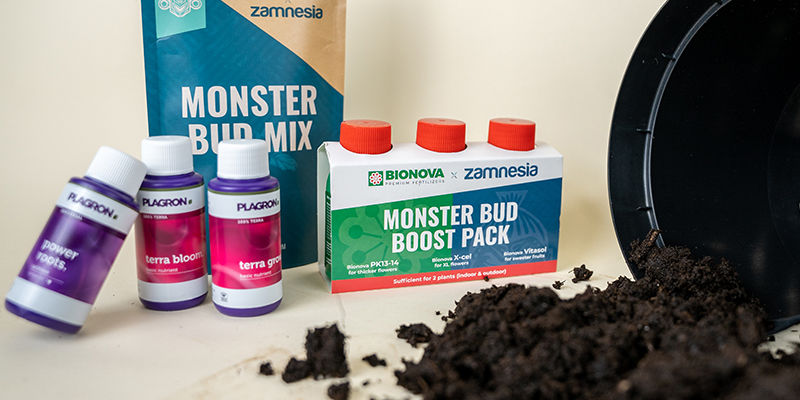
When growing your own cannabis, you want to be sure you end up with healthy, productive plants. Nothing is more annoying than spending a lot of time growing and caring for plants that don’t live up to your expectations.
In the context of cannabis, fertilisers are nutrient-rich mixes used to positively influence the growth, production, flavour, and potency of your plants. But not all fertilisers are the same, and they're not all created equal. In addition to fertiliser, it's very important that the soil itself is high-quality to allow all the nutrients to be properly absorbed.
Organic vs chemical fertilisers
Opinions are very much divided on whether synthetic or organic fertilisers are better. In all honesty, there is no clear answer to this. It really depends on each individual situation. What kind of cannabis plants are you looking to grow—photoperiod or autoflowering? What about volume and potency? There are so many things to take into consideration.
Some growers use a mixture of chemical and organic nutrients, while others stick to one or the other. A good way to get a clear view of what is best suited to your cultivation goals is to go through all the advantages and disadvantages of the chemical and organic nutrients out there. You can find more information about the different types of fertilisers here.
Ready-to-use vs homemade fertilisers
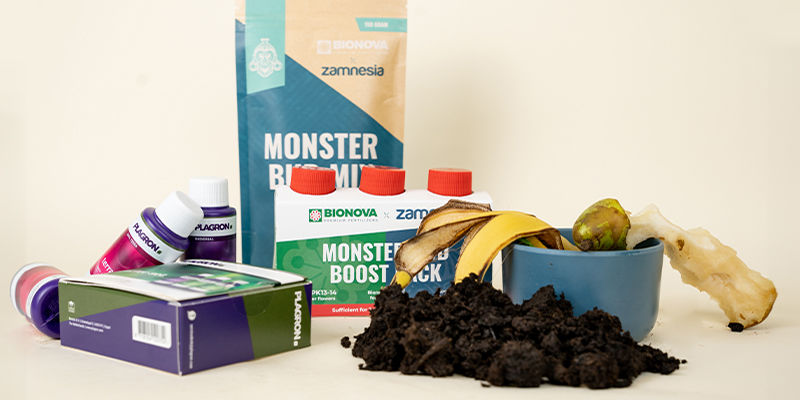
Using a bottled, ready-to-use fertiliser is very convenient and straightforward. However, using a homemade fertiliser has many benefits too.
Ready-to-use fertilisers make life so much easier. There is a lot of information at hand about how these bottled fertilisers work, so do some research to get a better idea of what to expect. The available options are tremendous, though, which might leave you feeling a bit lost. Many products also turn out to be quite expensive, which is one of the things that makes homemade fertilisers so attractive.
Even if you find a bottled fertiliser that is recommended precisely for the kind of cannabis you want to grow, there is still no guarantee of good results. If you have specific goals in mind, making your own fertiliser will give you greater control over how your plants grow.
Creating the perfect concoction is much easier than you think, often turning out to be much cheaper than ready-to-use fertilisers. Moreover, you will be able to remain discreet about your operations as you won’t need to buy fertiliser from a store.
The best ready-to-use fertilisers
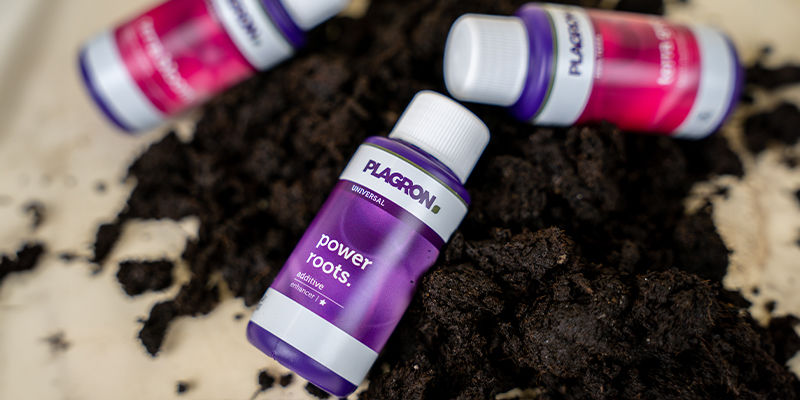
Not sure you have enough insight to create homemade fertiliser, or simply looking for convenience? Check out some of the best ready-to-use fertilisers below.
MONSTER BUD MIX ORGANIC FERTILISER
Zamnesia and Bionova have teamed up to create Monster Bud Mix. This is a powerful organic fertiliser that contains absolutely no animal ingredients. The all-in-one mix is sufficient to get 1–2 plants through the whole growing cycle, containing all the nutrients needed for each stage.
MONSTER BUD BOOST PACK
Those looking to make the most of their home-grow projects will want to check out Monster Bud Boost Pack. This potent three-pack of liquid fertilisers is a highly effective combination of nutrients that works in tandem with Monster Bud Mix to optimise your plants' potential throughout every phase. Each liquid fertiliser is packed with micronutrients that stimulate various aspects of their development, with the aim of providing bountiful, big, and flavourful buds come harvest. With an easy to follow schedule, Monster Bud Boost Pack allows your plants to flourish and be the best they can possibly be.
PLAGRON STARTER SET
Perfect for first-time growers, the Plagron Starter Set contains all the nutrients your plant needs for healthy development. This organic fertiliser set comes with three specific nutrient blends to take one plant from seed to harvest. Power Roots stimulates healthy rooting, Terra Grow helps with the growing phase, and Terra Bloom caters to the flowering phase.
The best homemade fertilisers for cannabis
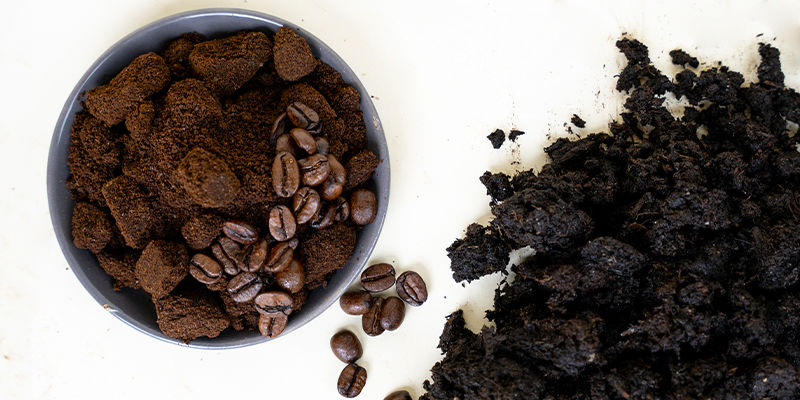
A very cost-efficient way to give your plants the right nutrients is to create your own fertiliser. Taking matters into your own hands, check out all the possibilities below to decide which type of mixture best meets your needs.
COMPOST OR COMPOST TEA
Although not officially a fertiliser, compost definitely contributes to plant nutrition. Macro and micronutrients are present in compost, but there’s not enough macronutrients to classify it as a fertiliser. However, robust growth depends on the quality of the soil just as much as it depends on nutrients. This is exactly where compost comes in.
Stimulating airflow and water in the soil, compost improves cation exchange capacity (CEC). Along with the added microbes, this improves the overall quality of the soil structure, causing the present nutrients to be more easily accessible to the plants. Read all about how you can make your own compost here, while the benefits of compost tea as a natural nutrient booster can be found here.
COFFEE GROUNDS
A nice proportion of mineral elements with high levels of nitrogen can be found in coffee grounds. This makes it a great slow-release nitrogen source for your plants. Other effects include its ability to repel parasites while masking the distinct cannabis odour. Moreover, this organic option is available in abundance, as coffee waste is produced all the time. This means you will be recycling while growing naturally.#
MANURE OR URINE
It’s a known fact that plants, flowers, and many types of fungi grow wherever animals defecate and urinate. That’s why it still remains one of the most important agricultural components all over the world. Manure is a great source of slow-release NPK, and you can find many manure recipes with ingredients derived from different animals. It really depends on your region; local farmers will know best.
Animals like sheep, goats, cows, chickens, rabbits, and horses can be found in most regions. The suitability of different types of manure from these animals, however, depends on what you are trying to grow. While some are more suitable for composting and worm production, others are more suitable for fermentation:
- Sheep: Can be very rich in nutrients through fermentation
- Goat: Even stronger version of sheep’s manure
- Cow: Moderately rich, but abundantly available
- Chicken: Also very rich, but needs dilution due to super strong NPK
- Rabbit: Very rich for composting and worm production
- Horse: Extremely suitable for potted plants and flowers
Urine is a fantastic nitrogen booster, from animals or even humans as long as it’s diluted with water. At a ratio of 10:1 water to urine, you can ensure it doesn’t turn into harmful ammonia. Thorough research is needed if you want to use manure or urine, as it can be quite tricky to work with. It’s a challenge to find a balance with the base soil, and, if not prepared properly, harmful pathogens will be produced. Again, talk to local farmers about what works.
COCONUT WATER
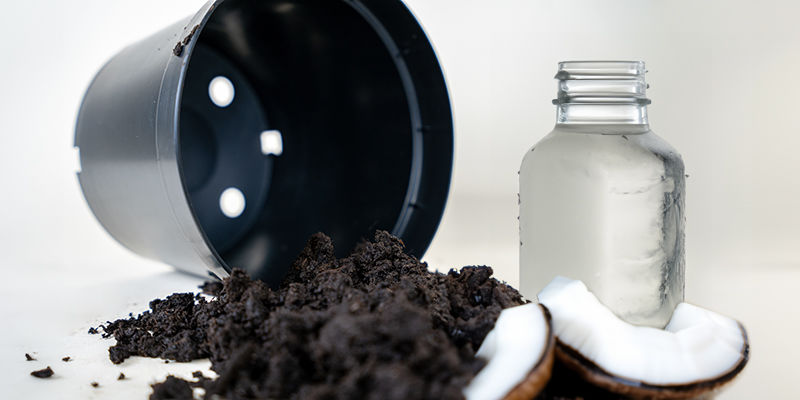
Known to be healthy for humans, coconut water is also an ideal growth stimulator for cannabis plants. Especially for larger marijuana plants, coconut water can have a great enhancing effect on clone development and root growth. It’s full of vitamins, minerals, amino acids, and cytokines, which makes it a rich all-natural fertiliser.
FERMENTED PLANT JUICE (FPJ)
Korean Natural Farming is known for using FPJ, as this holistic approach avoids chemicals by involving indigenous microorganisms. Plants are broken down and converted into absorbable nutrients derived from beneficial bacteria, which makes this a completely natural and organic method to create very high-quality soil.
FPJ can be harvested from the young parts of plants because they are very nutritionally dense. Many common plants, herbs, and weeds can be turned into FPJ, such as:
- Aloe vera
- Comfrey
- Horsetail
- Yarrow
- Stinging nettle
- Mugwort
- Lambsquarters
- Thistle
Bacteria is what puts the metabolic fermentation process into motion. Transforming big molecules into smaller ones and withdrawing their energy, bacteria simply extracts all the nutrition found in the plants. These beings feed on sugar, transforming the energy into alcohol. Finally, you will end up with a thick, nutrient-rich liquid containing many of the minerals needed to make plants grow.
You can also make FPJ from fruits:
- Cantaloupe melons
- Apricots
- Sweet peppers
- Berries
- Tomatoes
It’s very easy to make FPJ just by chopping up the fruits or plants into very small pieces and mashing them in a jar with an equal amount of brown sugar. To make sure no essential bacteria is lost, don’t wash the fruits or plants before cutting them. After 7–14 weeks of being stored in a dark and cool place, the mixture can be filtered and stored in a bottle in the fridge. Your FPJ is ready to be watered or sprayed onto your plants after adding 4 tablespoons of the mixture to 3.5 litres of water.
RECYCLED ORGANIC LIVING SOIL (ROLS)
.jpg)
A low-cost and quick way to fertilise your plants while using less water is recycled organic living soil (ROLS). Known for naturally decreasing the chances of plant disease, it is very easy to make yourself.
Unlock the full potential of your cannabis plants
In the quest for healthier cannabis plants and superior yields, choosing the right fertiliser is vital. This article serves as a general overview of ready-to-use plant nutrients and organic, homemade fertilisers. Both have their pros and cons, and which one you choose will depend on your growing style, skill, and preferences. Be sure to check out more of our growing articles for an in-depth look at cannabis fertilisation and other grow tips to maximise the health of your plants and, subsequently, the quality and size of your yields.
-
 4 min
August 14, 2023
How To Diagnose & Treat Cannabis Nutrient Lockout
Did you know that a common cause of nutrient deficiencies in cannabis is nutrient lockout? Keep reading to learn more about nutrient lockout, why it occurs, and how to best treat it to ensure a...
4 min
August 14, 2023
How To Diagnose & Treat Cannabis Nutrient Lockout
Did you know that a common cause of nutrient deficiencies in cannabis is nutrient lockout? Keep reading to learn more about nutrient lockout, why it occurs, and how to best treat it to ensure a...
-
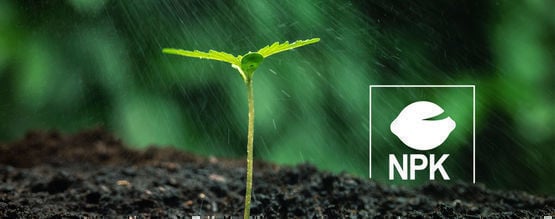 7 min
July 14, 2022
How To Feed Cannabis Plants Nutrients
A healthy cannabis plant requires a pretty strict diet. Think of it a bit like a top-level athlete, and yourself as their nutritionist. Optimising food intake is key to getting the best results....
7 min
July 14, 2022
How To Feed Cannabis Plants Nutrients
A healthy cannabis plant requires a pretty strict diet. Think of it a bit like a top-level athlete, and yourself as their nutritionist. Optimising food intake is key to getting the best results....
-
 7 min
October 14, 2021
NPK: What Is The Best Ratio For Growing Cannabis
Perhaps you’re new to cannabis cultivation, or just struggling with macronutrient deficiencies. Maybe it’s overfertilisation that’s spoiling your marijuana. Whatever substrate you use to grow...
7 min
October 14, 2021
NPK: What Is The Best Ratio For Growing Cannabis
Perhaps you’re new to cannabis cultivation, or just struggling with macronutrient deficiencies. Maybe it’s overfertilisation that’s spoiling your marijuana. Whatever substrate you use to grow...
-
 4 min
December 31, 2018
What's The Difference: Synthetic Vs. Natural Fertilizer
Synthetic vs organic fertiliser is a heavily debated topic when it comes to growing cannabis. So let’s take a look at the advantages and disadvantages of each.
4 min
December 31, 2018
What's The Difference: Synthetic Vs. Natural Fertilizer
Synthetic vs organic fertiliser is a heavily debated topic when it comes to growing cannabis. So let’s take a look at the advantages and disadvantages of each.











 United States
United States









